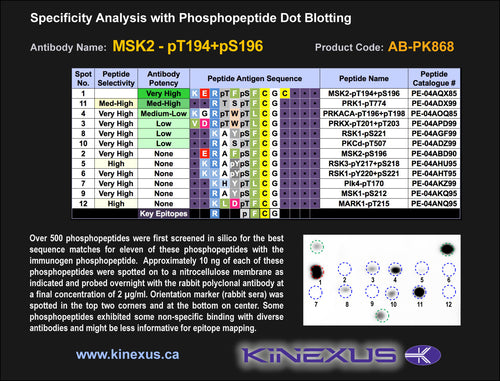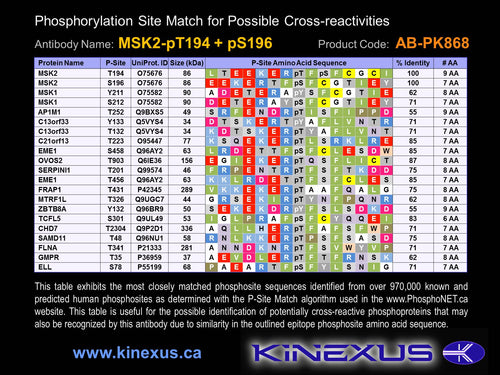Product Name:
MSK2-pT194 + pS196
Product Number:
ab-pk868
Target Full Name: Ribosomal protein S6 kinase alpha-4
Target Alias: Kinase MSK2; KS6A4; Ribosomal protein kinase B; Ribosomal protein S6 kinase, 90kDa, polypeptide 4; RPS6KA4; RSK-B; Similar to ribosomal protein S6 kinase, 90kD, polypeptide 4; Similar to ribosomal protein S6 kinase, polypeptide 4; CCDS8073.1; ENSG00000162302
Product Type Specific: Protein kinase phosphosite-specific antibody
Antibody Code: PK868
Antibody Target Type: Phosphosite-specific
Antibody Phosphosite: T194+S196
Protein UniProt: O75676
Protein SigNET: O75676
Antibody Type: Polyclonal
Antibody Host Species: Rabbit
Antibody Immunogen Source: Human MSK2 (RPS6KA4) sequence peptide Cat. No.: PE-04AQX85
Antibody Immunogen Sequence: KER(pT)F(pS)FCGC
Antibody Immunogen Description: Corresponds to amino acid residues K191 to G199; In protein kinase catalytic domain activation T-loop between subdomains VII and VIII.
Production Method: Corresponds to amino acid residues K191 to G199; In protein kinase catalytic domain activation T-loop between subdomains VII and VIII.
Antibody Modification: Protein kinase phosphosite-specific antibody
Antibody Concentration: 0.5 mg/ml
Storage Buffer: Phosphate buffered saline pH 7.4, 0.05% Thimerasol
Storage Conditions: For long term storage, keep frozen at -40°C or lower. Stock solution can be kept at +4°C for more than 3 months. Avoid repeated freeze-thaw cycles.
Product Use: Western blotting | Antibody microarray
Antibody Dilution Recommended: 2 µg/ml for immunoblotting
Antibody Species Reactivity: Human
Antibody Positive Control: The observed molecular mass of the processed target protein on SDS-PAGE gels is reported to be around 83-90 kDa.
Related Product 1: MSK2-pT194 + pS196 blocking peptide
Related Product 2: MSK2-pT687 phosphosite-specific antibody (Cat. No.: AB-PK725)
Related Product 3: MskSubtide - MSK1 (RPS6KA5) protein kinase substrate peptide
Scientific Background: MSK2 (RPS6KA4) is a protein-serine/threonine kinase of the AGC group and RSK family. It is required for the mitogen or stress-induced phosphorylation of the transcription factors CREB1 and ATF1 and for the regulation of the transcription factor RELA, and that contributes to gene activation by histone phosphorylation and functions in the regulation of inflammatory genes. It phosphorylates CREB1 and ATF1 in response to mitogenic or stress stimuli such as UV-C irradiation, epidermal growth factor (EGF) and anisomycin. It plays an essential role in the control of RELA transcriptional activity in response to TNF. It phosphorylates S10 as well as S28 of histone H3 in response to mitogenics, stress stimuli and EGF, which results in the transcriptional activation of several immediate early genes, including proto-oncogenes c-fos/FOS and c-jun/JUN. It mediates the mitogen- and stress-induced phosphorylation of high mobility group protein 1 (HMGN1/HMG14). In lipopolysaccharide-stimulated primary macrophages, acts downstream of the Toll-like receptor TLR4 to limit the production of pro-inflammatory cytokines. It appears to induce activation of the MAP kinase phosphatase DUSP1 and the anti-inflammatory cytokine interleukin 10 (IL10), via CREB1 and ATF1 transcription factors. F709A substitution is associated with strongly elevated basal activity. MSK2 is activated by phosphorylation at S196, S343, S347, T360, T568 and T687. Aberrant activation of members of the family have found to be linked with many human diseases, such as breast and prostate cancers.



